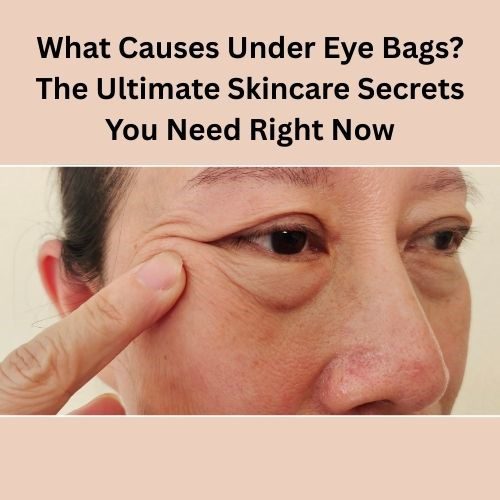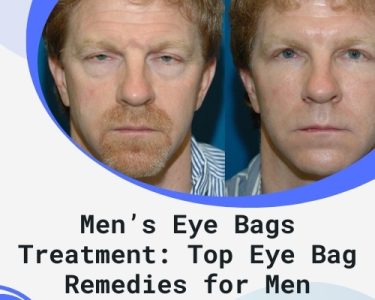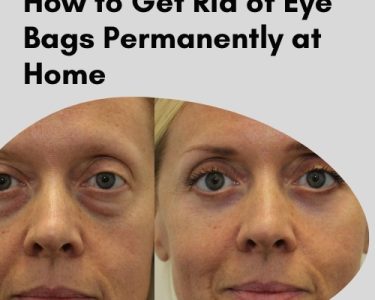Under-eye bags are one of the most common beauty concerns worldwide, and millions of people search daily for answers about what causes under eye bags and how to treat them effectively. Before diving deeper, it’s important to understand that this issue is not always about aging—many factors can contribute.
At the very beginning of this guide, it’s essential to highlight how people often describe this condition, including phrases like eye bags – red puffiness of eyes, which capture the frustration and discomfort associated with persistent swelling. Understanding the root causes is the first step toward prevention and effective treatment.
Some individuals also look for how to get rid of eye bags permanently at home, hoping for fast and natural solutions. While complete elimination is not always possible, significant improvement is achievable with the right knowledge. This article reveals natural remedies that actually work along with expert-approved skincare strategies.
Understanding What Causes Under Eye Bags
The primary question most people ask is straightforward: what causes under eye bags? The short answer is that under-eye puffiness results from a combination of genetics, lifestyle, skin structure, and aging. However, the detailed causes are much more nuanced.
Below is a breakdown of the most common and scientifically supported reasons behind this condition.
Natural Aging and Skin Changes
One of the biggest contributors to what cause bags under eyes is the natural aging process. As we grow older:
- The skin loses elasticity
- Collagen production slows
- Muscle tissues weaken
- Fat from around the eyes shifts downward
This leads to loosening of skin under the eyes, one of the earliest signs of visible aging. The skin becomes thinner, making swelling, darkness, and puffiness more prominent.
Fluid Retention and Inflammation
Another major factor behind what causes bags and puffiness under eyes is fluid retention. This happens because:
- You slept in an improper position
- You experienced allergies
- You consumed high-salt meals
- You were exposed to smoke or pollution
- You cried or rubbed your eyes
- You experienced poor lymphatic drainage
When the delicate under-eye area retains water, it expands, creating puffiness and swollen bags.
Genetics and Hereditary Factors
Sometimes, what causes huge bags under eyes is simply a matter of genetics. If your parents or grandparents have large, visible under-eye bags, you might inherit the same tendency.
Genetic eye bags appear even when you sleep well, eat healthy, and avoid allergens. They are often:
- Larger
- More persistent
- Visible from a younger age
Even though hereditary puffiness is harder to treat, it can still be minimized with targeted skincare and lifestyle changes.
Lifestyle Triggers and Poor Habits
Many people unknowingly worsen their eye bags through everyday habits. Some common lifestyle factors include:
Lack of Sleep
Poor sleep quality disrupts the body’s natural repair cycle, leading to swelling and darkness.
High Salt Intake
Salt traps water under the skin, making the bags appear larger and more noticeable.
Dehydration
When you don’t drink enough water, your body retains fluid as a defense mechanism.
Excessive Alcohol Consumption
Alcohol dehydrates your body and worsens inflammation.
Smoking
Smoking weakens collagen, accelerates aging, and causes premature under-eye sagging.
Allergies and Sinus Problems
Blocked sinuses and allergies are major culprits behind swollen, tired-looking eyes. Histamine reactions cause:
- Itching
- Rubbing
- Redness
- Inflammation
- Puffiness
Allergies also worsen dark circles, which make eye bags seem even larger.
Stress and Hormonal Imbalances
Stress affects nearly every part of the body—including the delicate area under the eyes. High levels of cortisol can lead to inflammation, fluid retention, and poor sleep, all of which worsen eye bags.
Additionally, hormonal changes during pregnancy, menstruation, or menopause can cause swelling and puffiness.
The Science Behind Eye Bag Formation
To understand what causes under eye bags, it helps to know what’s happening beneath the skin.
Eye bags form due to structural changes in:
- Fat pads: They shift downward due to gravity or aging.
- Skin: It becomes thin, loose, and less elastic.
- Muscles: They weaken, allowing the fat to bulge forward.
- Blood vessels: Poor circulation causes darkness and swelling.
- Lymphatic system: Sluggish drainage leads to fluid buildup.
Together, these changes create puffiness, swelling, and visible bags that appear worse in poor lighting or after waking.
What You Can Do to Prevent or Reduce Under Eye Bags
Now that you know what causes under eye bags, here are effective strategies to reduce them.
Improve Your Sleep Habits
Proper sleep is essential.
Try these tips:
- Sleep 7–9 hours
- Elevate your head with a second pillow
- Avoid screens before bedtime
- Maintain a consistent sleep schedule
Reduce Your Salt Intake
Lowering sodium helps reduce water retention. Avoid:
- Chips
- Fast food
- Processed items
- Salt-heavy snacks
Manage Allergies Properly
Use antihistamines or natural remedies to reduce swelling and inflammation. Avoid rubbing your eyes at all costs.
Commit to a Gentle Skincare Routine
Look for under-eye products with:
- Caffeine
- Hyaluronic acid
- Peptides
- Retinol
- Niacinamide
These ingredients improve circulation, tighten skin, and reduce fluid retention.
Use Cold Compresses
Cold therapy is an effective way to tighten blood vessels and reduce swelling quickly.
Try:
- Cold cucumber slices
- Ice rollers
- Chilled spoons
- Refrigerated eye masks
Stay Hydrated and Maintain a Healthy Diet
Hydration supports lymphatic drainage and skin elasticity. Add:
- Fresh fruits
- Vegetables
- Omega-3 fatty acids
- Plenty of water
Stop Smoking and Limit Alcohol
Smoking accelerates aging and alcohol worsens inflammation. Reducing both drastically improves the appearance of your eyes.
Professional Treatments for Under Eye Bags
If home remedies do not work, professional treatments can make a visible difference.
Some of the most effective options include:
Dermal Fillers
These fill in hollow tear troughs and reduce the shadow effect caused by bags.
Laser Resurfacing
Lasers help tighten loose skin and promote collagen production.
Chemical Peels
Peels improve texture, thickness, and elasticity.
Radiofrequency Therapy
Helps firm and tighten sagging skin over time.
Surgery (Blepharoplasty)
For severe or hereditary bags, surgical intervention offers long-lasting results.
Natural Home Remedies to Reduce Under Eye Bags
Many people also search for easy home remedies and beauty hacks that help reduce puffiness without expensive treatments.
Here are some powerful natural options:
- Cold milk compress
- Aloe vera gel
- Rose water pads
- Tea bags (green or chamomile)
- Potato juice
- Turmeric paste
- Almond oil massage
These techniques support circulation and help the skin appear smoother and less swollen.
Do’s and Don’ts for Treating Eye Bags
These tips complement the keyword natural remedies for eye bags what you do’s and don’ts during treatment, which is essential for safe skincare.
DO
- Be consistent
- Use sun protection daily
- Be gentle around the eye area
- Hydrate throughout the day
DON’T
- Apply harsh chemicals
- Sleep with makeup on
- Rub or tug the skin
- Skip sunscreen
Final Thoughts: Achieving Fresh, Bright Eyes
Understanding what causes under eye bags is the first step toward finding the best solutions. Whether your bags are caused by aging, genetics, allergies, or lifestyle habits, there are many effective ways to reduce them.
For some people, herbal supplements can support overall skin health, which is why many consider options like Glamical – eye bags under the eyes reduce with herbal supplement as part of their natural routine. Others prefer medical procedures, often described as the best treatment under eye bags, especially when puffiness is severe.
Ultimately, you can achieve brighter, tighter, and more youthful-looking eyes by combining the right skincare routine, healthy habits, and targeted treatments.




